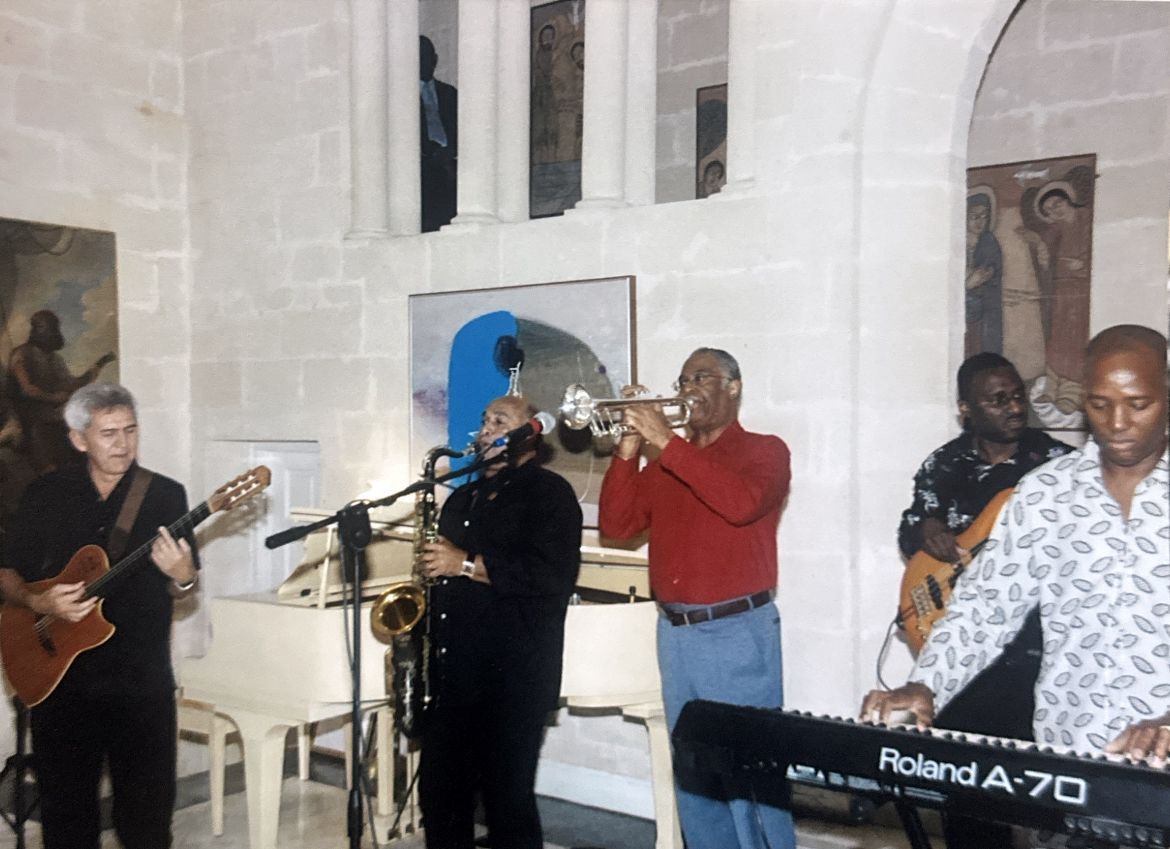Making a difference back home
Alumnus and retired Chief Justice of Barbados Sir David Simmons looks back on 1960s LSE and his life lived during a pivotal time in Barbadian history.
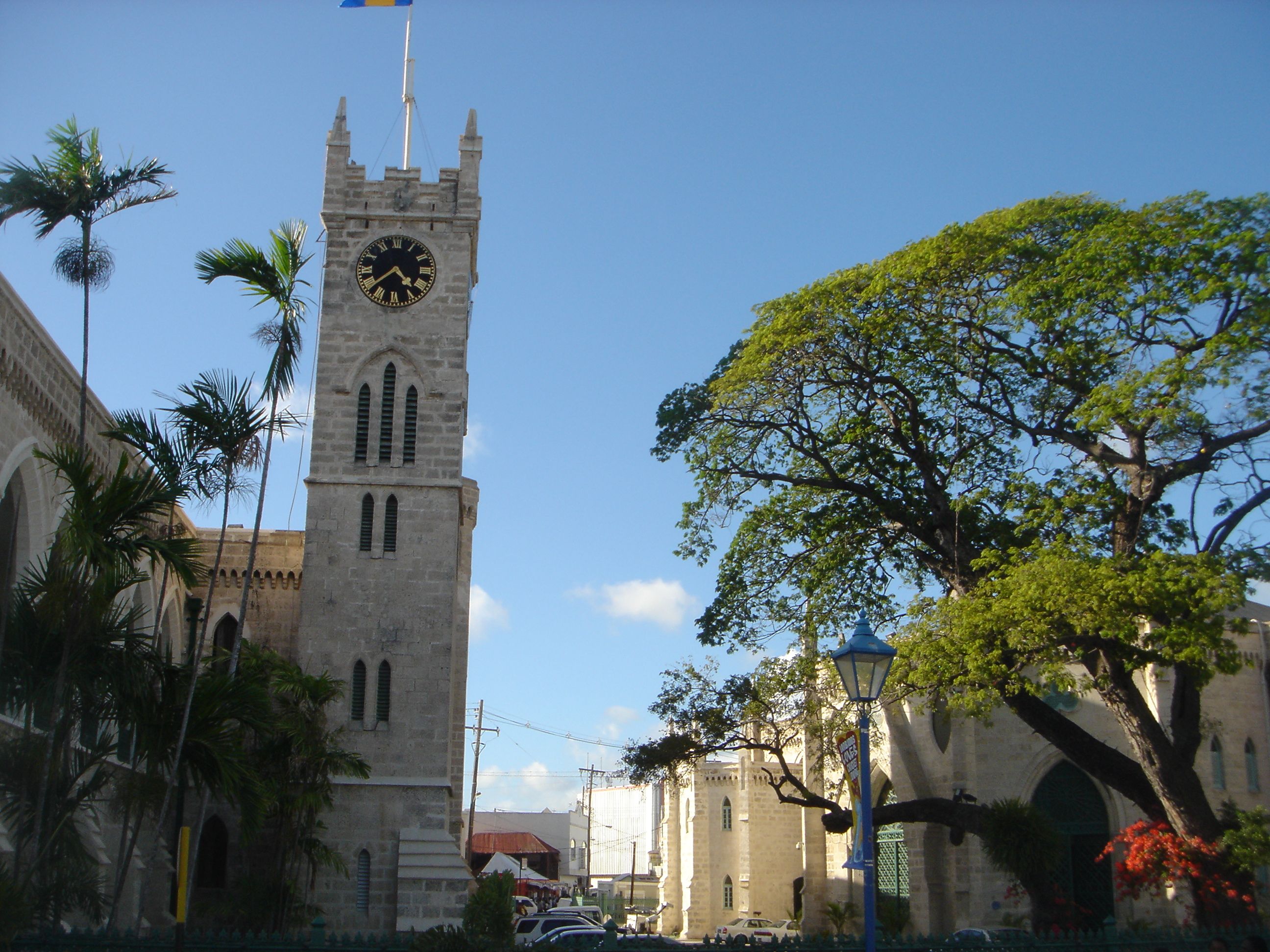
As a child Sir David Simmons (LLB Law 1963, LLM Law 1965) grew up in a Barbados that was moving away from the British colonial system. As an adult David found himself as part of the shaping of the new independent country, first as a lawyer and then as a politician. Now retired, David ended his career in the position of Chief Justice of Barbados. Today he looks back on his life, his experiences at LSE and his work in building a better Barbados.
Growing up in colonial Barbados
Growing up in Barbados during the 1940s and 1950s was exciting for my family and me for change was rapid and all-pervasive. It was constitutional with the introduction of Ministerial government in 1954, and the establishment of cabinet government led by a Premier in 1958. It was political with universal adult suffrage granted in 1951 - and it was social with the ascendancy of the majority black population to positions of power. It was also a time when the tourism industry, which was to become an economic mainstay in the future, was at its birth. The people of Barbados were slowly preparing for the transition from colonialism to independence and it was into this mix of progressive ideas and actions that I was born on 28 April 1940.
I grew up with my family at the Government Industrial School (known as Dodds) where my father was Principal. Dodds was the equivalent of an English Approved School to which juvenile delinquents were sentenced. My parents were very liberal, and they encouraged my siblings and me to interact with the inmates. This experience contributed immeasurably to the appreciation for the misfortune of poverty, my observance of the inequities of the colonial penal system and to my socialisation.
When it came time to start secondary education, I was sent to the Lodge School, which was then the second leading secondary school on the island. I had no difficulty in passing my A-level exams in the Classics (Latin, Greek and Ancient History) and duly became Head Boy in 1959. I was also good at cricket and athletics and played against some of the leading West Indies cricketers of the day! But the Lodge School was racist. The School’s boarding establishment was open only to white boys from Barbados and the Southern Caribbean. So, I experienced in my adolescence a kind of unwritten apartheid. Not legislated but institutional.
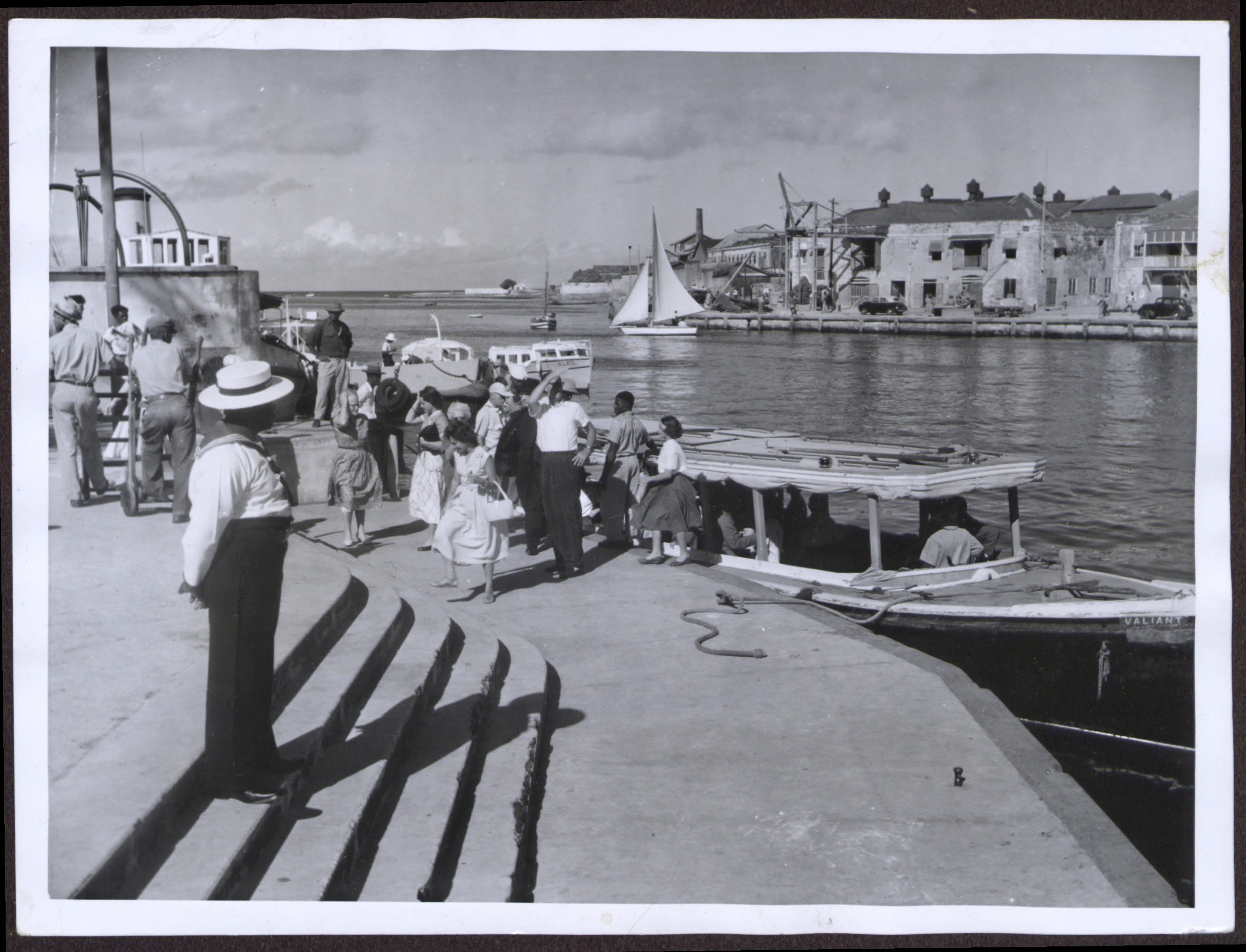
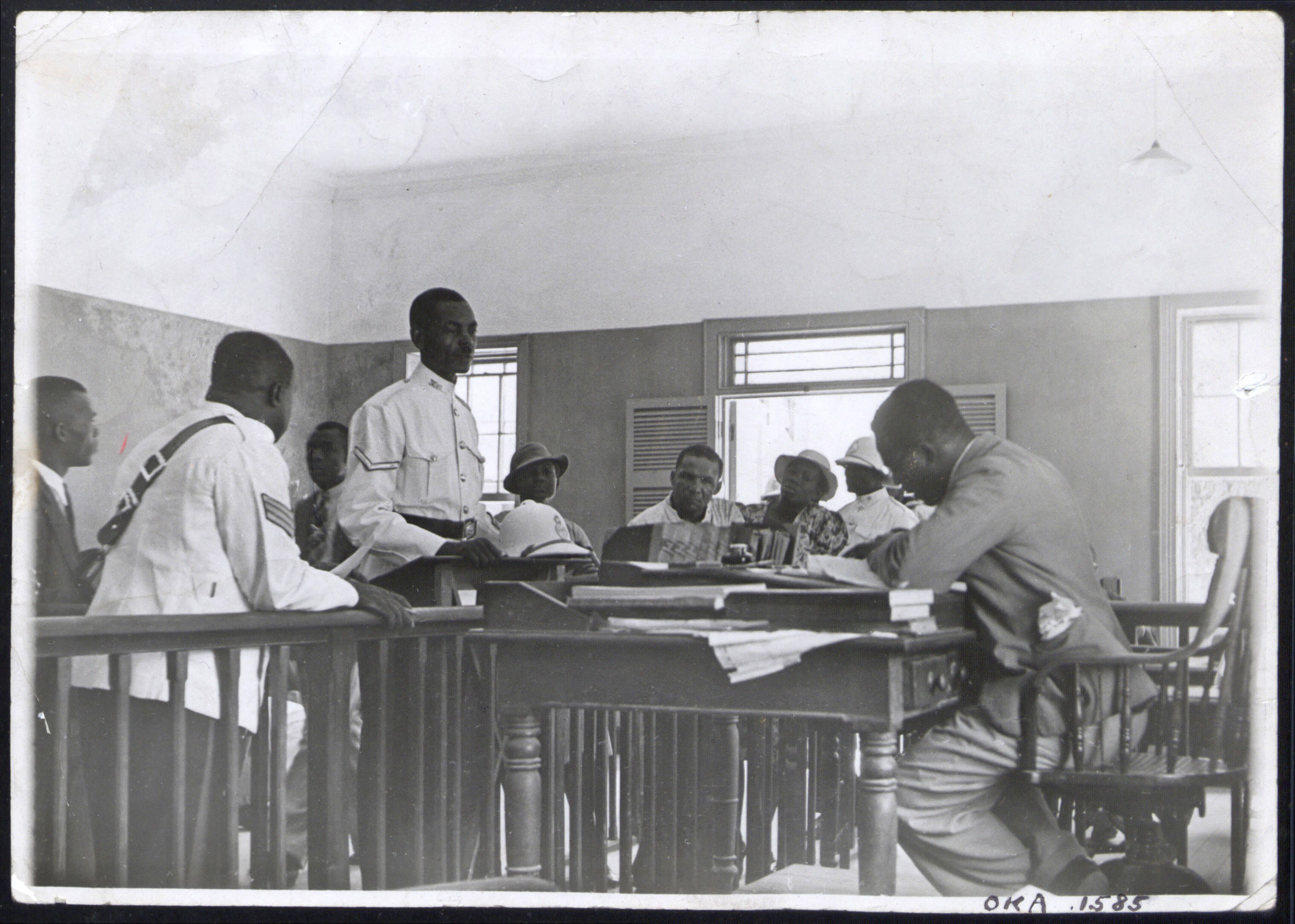
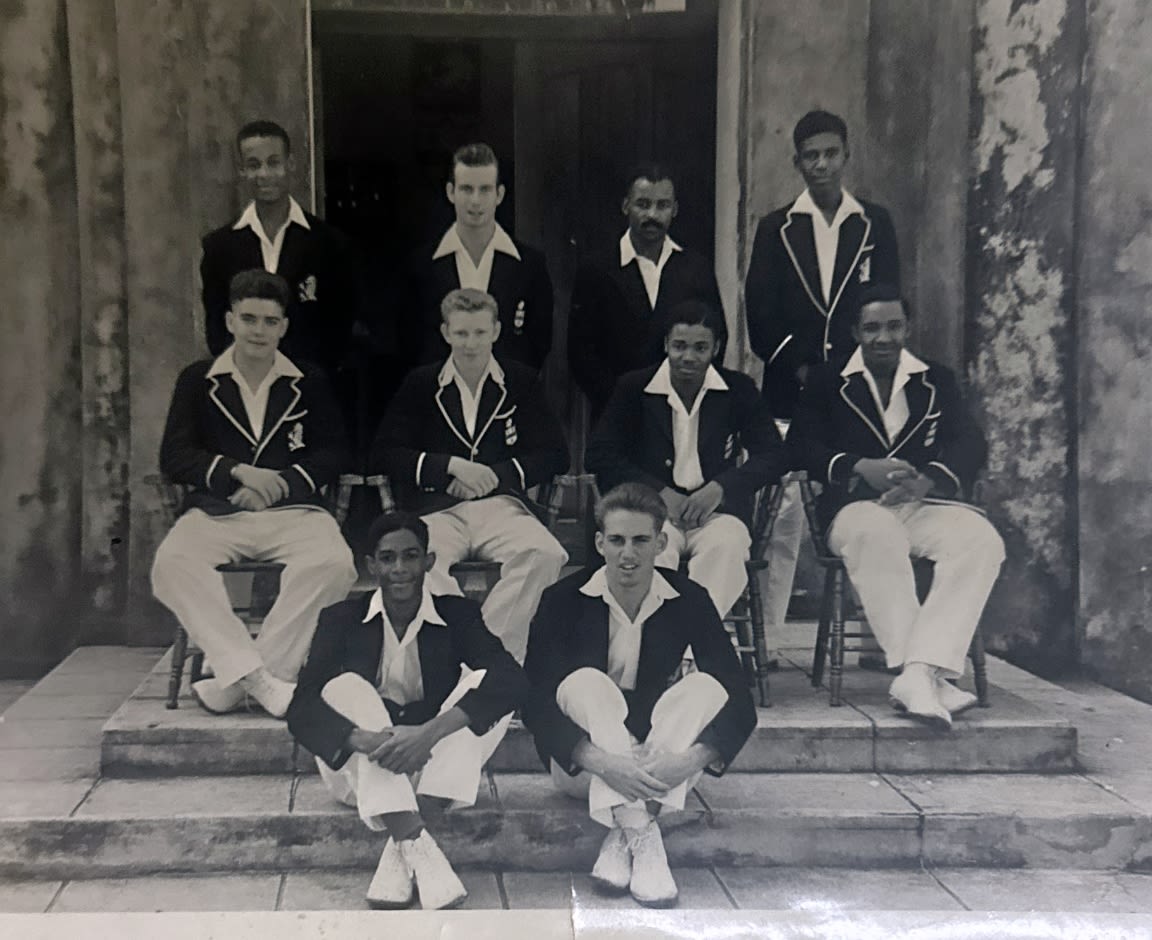
Come to Barbados. Fly overnight to lovely summer sunshine, tonic breezes, golden sands, perfect bathing, fun and games, warm-hearted welcome.
The Tatler, 22 August 1956
(Being at Dodds) brought me into the realisation that the penal system that then existed as part of the colonial condition was unjust.
Sir David Simmons: His Life in Focus, Sherwood McCaskie 2021
There was no socialisation. You didn’t visit the home of a white boy and he didn’t visit yours. You never got to know his parents so he didn’t get to know yours.
David Simmons: His Life in Focus, Sherwood McCaskie 2021
Culture shock
With a background in the Classics, I could have found employment after school in the civil service, the teaching profession or the priesthood. But my father was insistent that I should pursue “an independent profession” as he called the legal profession. LSE accepted my application in June 1960, but my Headmaster at the Lodge School was worried that I would be trained to be a Communist since he had heard of the work of Harold Laski at LSE. However, my mentor Sir Grantley Adams, the first Prime Minister of Barbados, and his successor, Errol Barrow, an LSE alumnus, encouraged me to study law.
When I left Barbados on 8 September 1960 for London on the ship, SS Antilles, I was nervous but also anxious to see what the “Mother Country” had to offer. I quickly learnt that so many aspects of life in Britain were a culture shock for me. Everything was on a larger scale than in Barbados and London was very cold and unfriendly. Few people knew of Barbados - my bank manager thought it was part of Jamaica! The food was plentiful but bland and unappealing except for what was sold in the Indian and Chinese restaurants. And in those days, there were not as many Barbadians in London as in the late sixties and onwards. I therefore had very few Barbadian friends.
What was not large was the monthly allowance sent by my father. £35. But I was able to survive and even buy cigarettes! Playing trumpet in Ivan Chin's West Indian Band supplemented my allowance on weekends with gigs at 1 Hans Crescent and the West Indian Students’ Centre in Earls Court.
"Clapham Inter-Racial Club are celebrating their second anniversary on Saturday to the music of two West Indian bands at Wandsworth Town Hall, Wandsworth High Street. The bands, Ivan Chin and his West Indian Band and Carl Jones and his Trinidad Tropicana Band, will be providing the tempo for dancing during the evening."
Streatham News Friday 5 May 1961
Life at LSE
I enjoyed my five years at LSE. I was there 1960-63 for my undergraduate and then again in 1963-65 for my master’s in law. In those days LSE surely had the best Law Department in the UK! I was fortunate to have been taught by professors Stanley de Smith, John Griffith, “Jim” Gower, Otto Khan Freund, Cyril Grunfeld, Bill Wedderburn, “Ash” Wheatcroft and Eryl Hall Williams. I formed many lasting friendships, including with P.J. Patterson who became Prime Minister of Jamaica. When I left LSE, I was determined to put into practice the advice of Professor John Griffith – “Try to make a difference to your country when you go back home.”
After completing my master’s in 1965, I lectured in law at Woolwich Polytechnic (now London Southbank University) and West London College. I also passed the Bar exams and became a Barrister of Lincoln’s Inn.
1966 was an important year in my life as I got married to my wife Marie MacCormack. Marie had her own law career and she became the first female judge of the Barbados supreme court. Our wedding day was the 30 July - the day that England won the World Cup!
1966 was also the year that Barbados became independent. I was contracted to cover the Barbados Constitutional Conference in 1966 for the Daily News newspaper and Rediffusion radio in Barbados. I went to the studios of the BBC Caribbean Service every evening to record a report for Rediffusion and then to send a larger printed version to the newspaper. I have always treasured that experience because I observed the various arguments and decisions leading to the development of the Barbados Constitution.
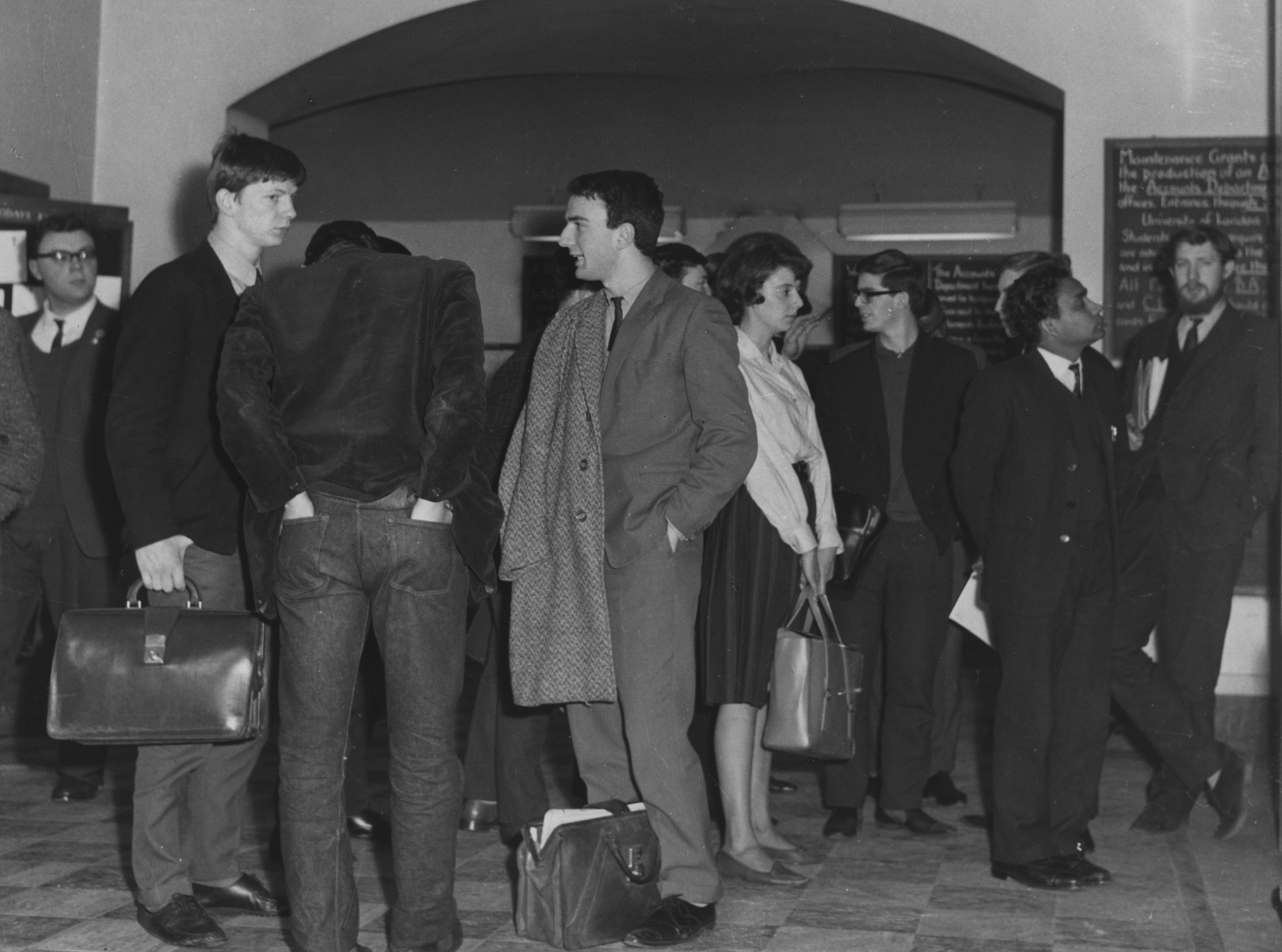
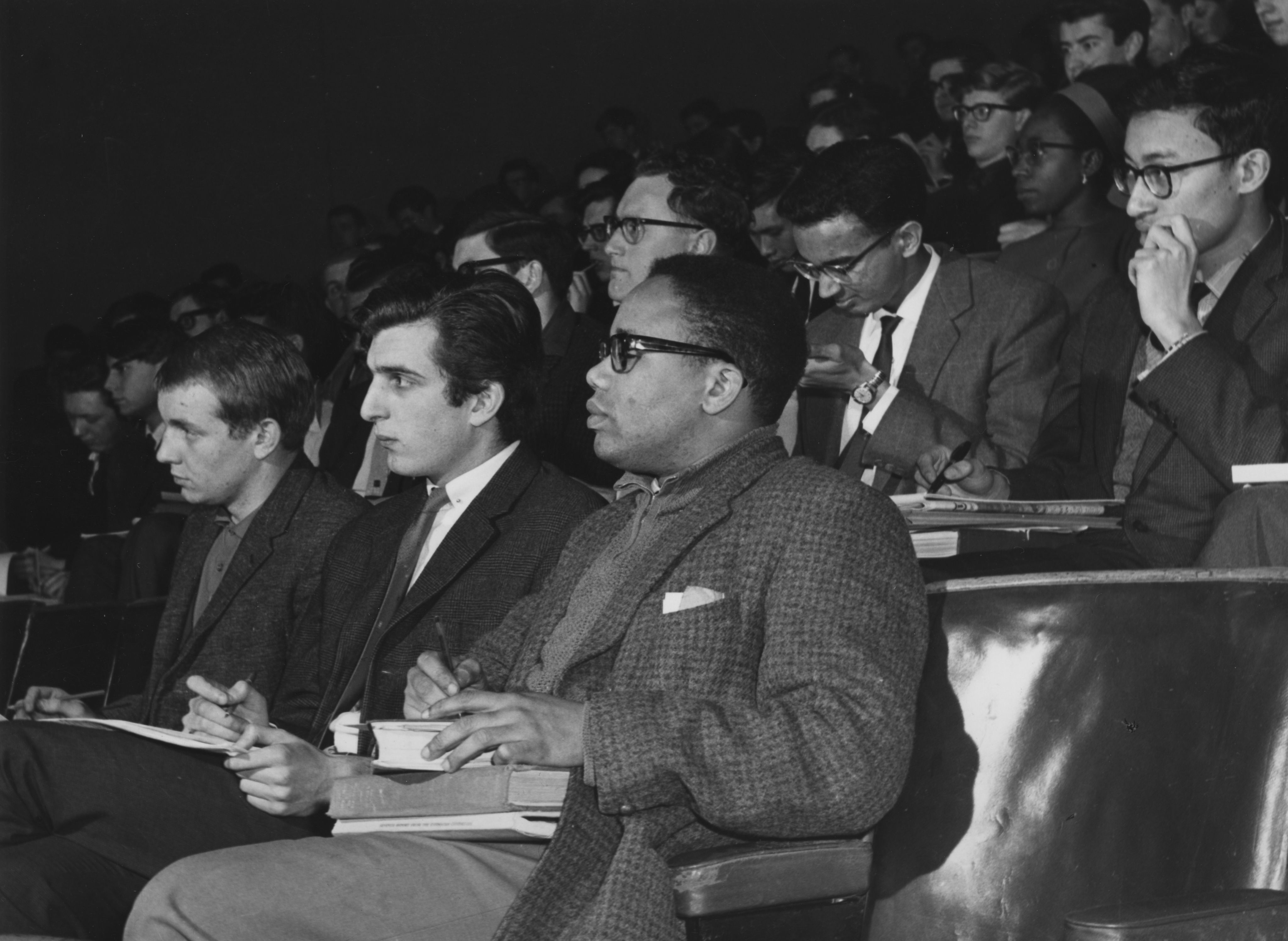
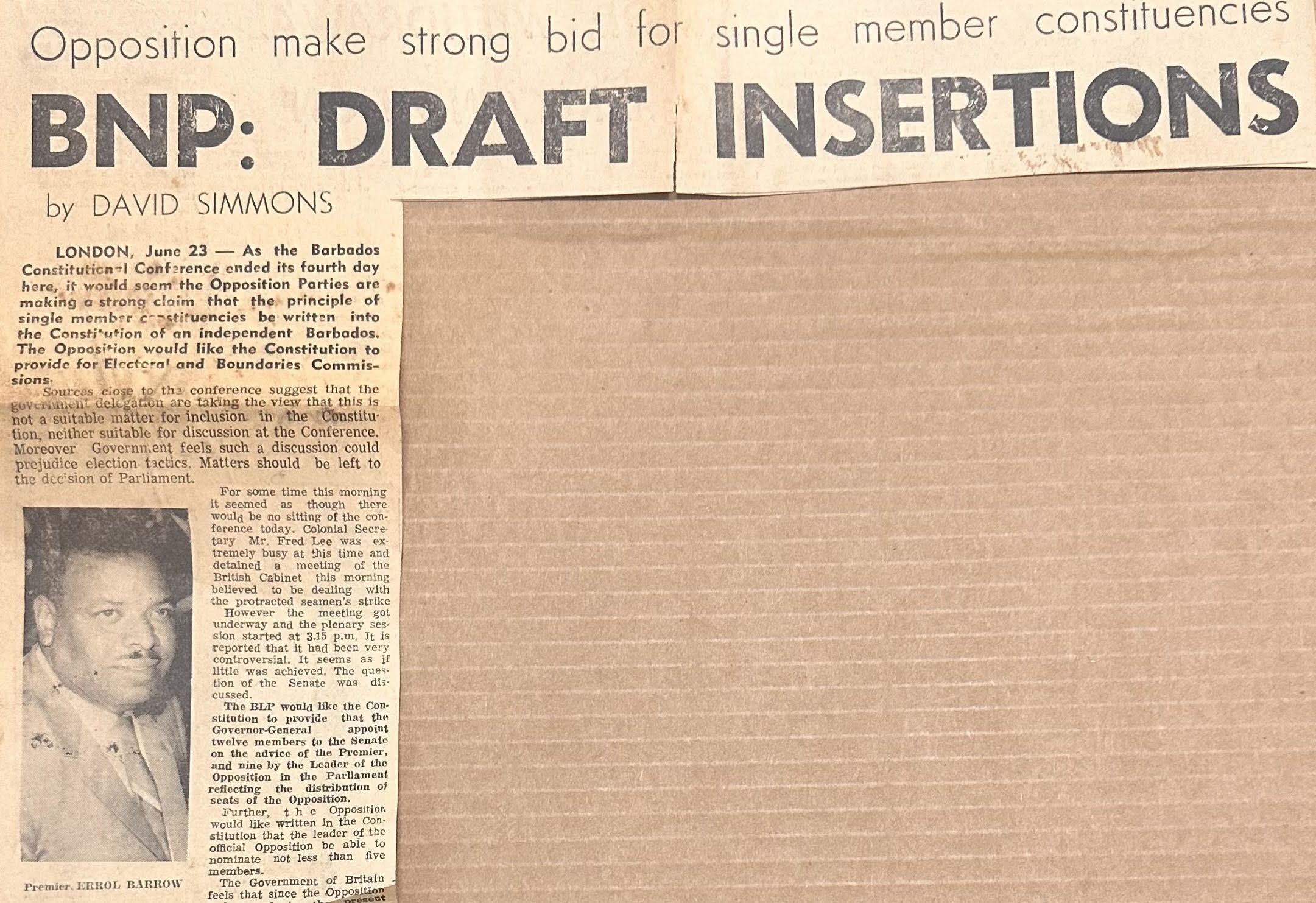
The most liberal educational institution that you could come across. You had all kinds of societies. You had a Communist society, you had a Labour society, Conservative society - we had a West-Indian society.
Sir David Simmons: His Life in Focus, Sherwood McCaskie 2021
The Freshers debate was held on Monday 11 October. The motion before the House was - This House believes the Conservative Party morally bankrupt.
The Beaver, 27 October 1960
Sir David Simmons reports on the Barbados Constitutional Conference in 1966.
Making a difference back home
I returned home permanently in June 1970. I hoped to break into the areas of corporate and commercial law that I had specialised in at LSE. But I found that those areas were already the preserve of four unmoveable lawyers. Nevertheless, I grew my private practice and lectured on a part-time basis for five years at the Faculty of Law of the University of the West Indies.
It was natural that I would eventually enter elective politics as a member of the Barbados Labour Party as I had been a member since 1957 when I joined the League of Young Socialists. I ultimately spent 25 years in politics, which I found very satisfying. I was able to assist, in many ways, large numbers of people and improve their lives. Although law can be satisfying, it doesn’t give you much opportunity to make changes. You are either representing one person in trouble with the law or adjusting relationships between two people. Politics and enacting law reform gave me the opportunity to make improvements on a larger scale.
Becoming Chief Justice
In 2002 I was appointed Chief Justice of Barbados. In a small developing island state like Barbados the role of the Chief Justice is multifaceted. It is judicial, requiring the deciding of appeals and writing judgments, but it is also administrative. Luckily, I had great experience of the public sector through my Chairmanship of several statutory boards and through being Attorney-General, a role I performed between 1985 and 1986 and then again from 1994 to 2001. Consequently, administration was not a problem. I think it is useful if a judicial officer has had previous public sector experience.
When it comes to my achievements, I prefer to record that in November 2022 the Government of Barbados re-opened and re-named the former Supreme Court complex in Bridgetown in honour of myself and Sir Henry Forde for our contribution to law and justice. It is now called the Henry Forde and David Simmons Legal and Judicial Complex. This year the Academy for Law of the Caribbean Court of Justice included me in a publication titled Legendary Caribbean Legal Practitioners. When the book was presented, Justice Winston Anderson of the CCJ described me as one of the greatest Chief Justices that Barbados has had!
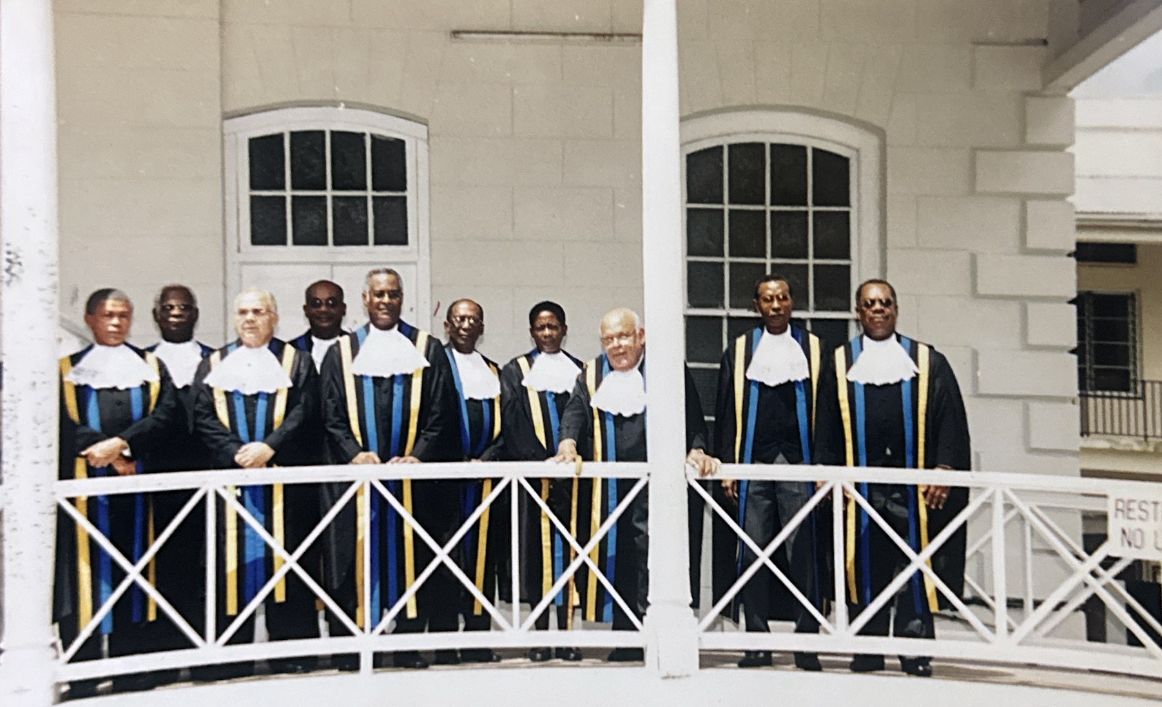
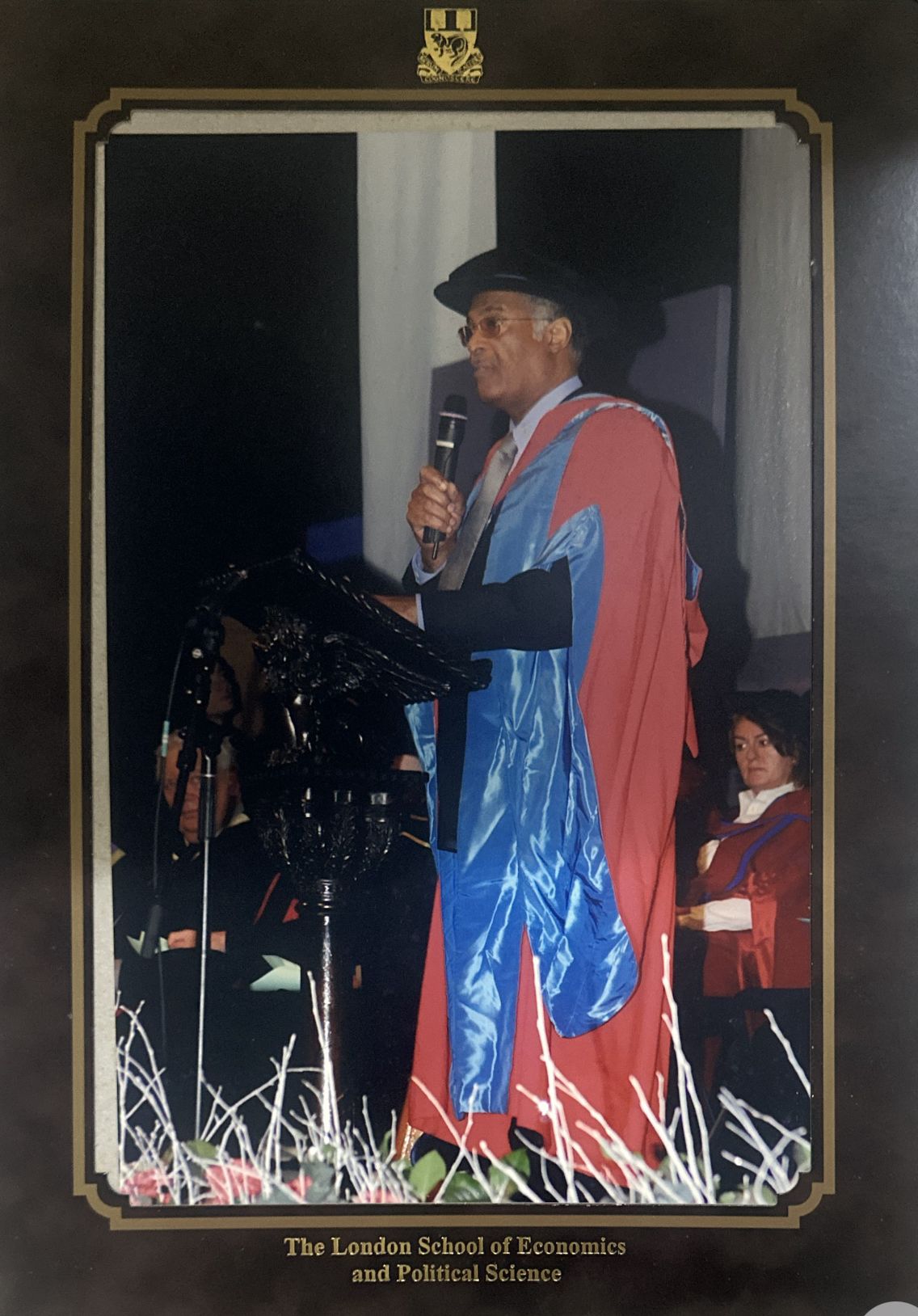
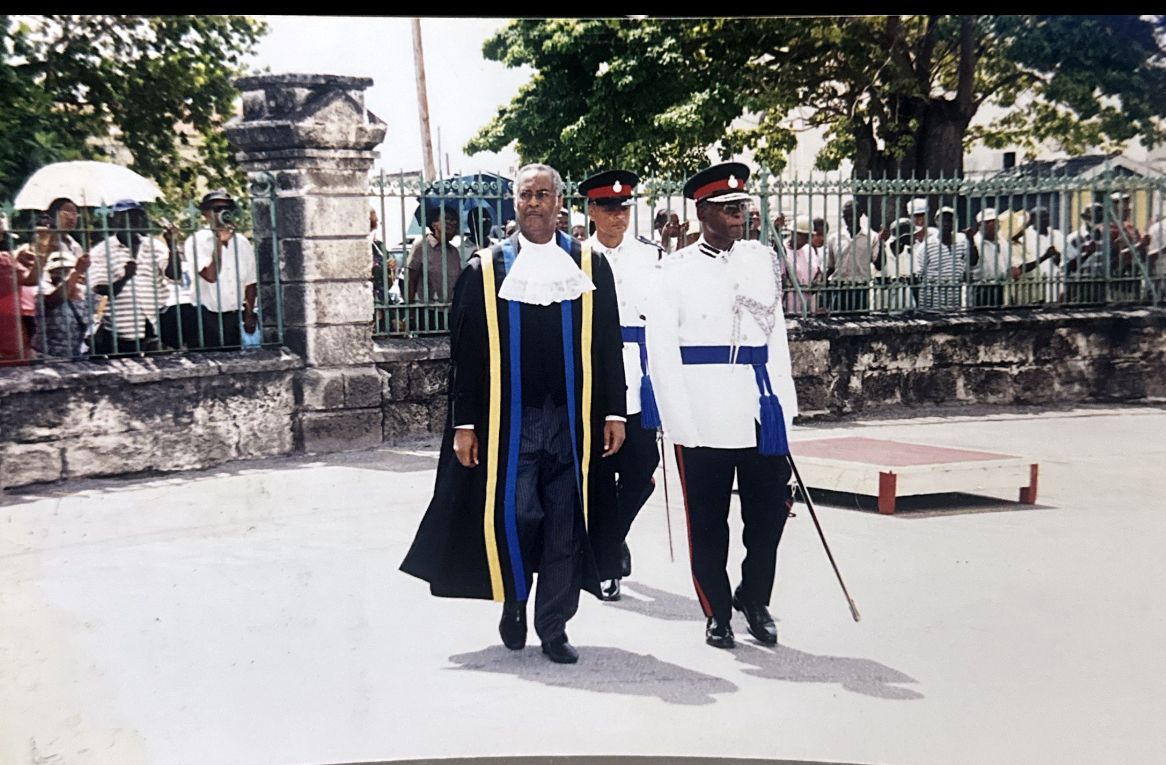
Sir David Simmons stands outside of the Supreme Court alongside fellow judges wearing the new judicial attire for the legal year of 2003.
You get so much more satisfaction from the political experience because of the impact that something that you do has on people's lives and existence.
Sir David Simmons: His Life in Focus, Sherwood McCaskie 2021
It was time for us in our institutions to reflect what we were rather than what somebody else wanted us to look like.
Sir David Simmons: His Life in Focus, Sherwood McCaskie 2021
Looking forward
Sixty-four years ago, when I began my undergraduate journey at LSE, the School had a reputation of being the most cosmopolitan tertiary education institution in England. I suspect that that reputation is still intact. I therefore encourage Caribbean law students to participate freely in the School’s extra-curriculum activities. Enjoy them, network and build contacts worldwide. However, I also counsel you to study legal principles in their wider historical and social contexts and purposes. That is the tradition of the study of law that I was exposed to at LSE.
October 2024
Interested in reading LSE alumni life stories?
Explore more alumni profiles.
Quotes sourced from:
LSE's Beaver Archive
British Newspaper Archive
Sir David Simmons: His Life in Focus, Sherwood McCaskie 2021
Sir David Simmons plays trumpet with friends at the Brazilian Embassy in Barbados in 2012
Sir David Simmons plays trumpet with friends at the Brazilian Embassy in Barbados in 2012

